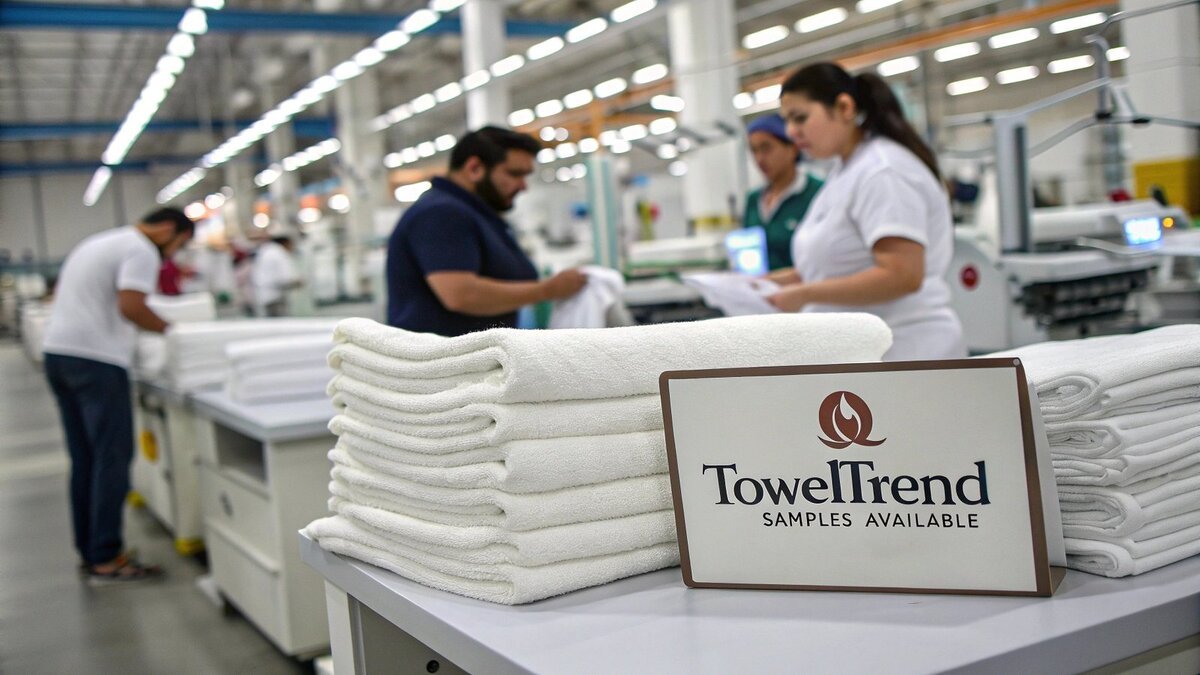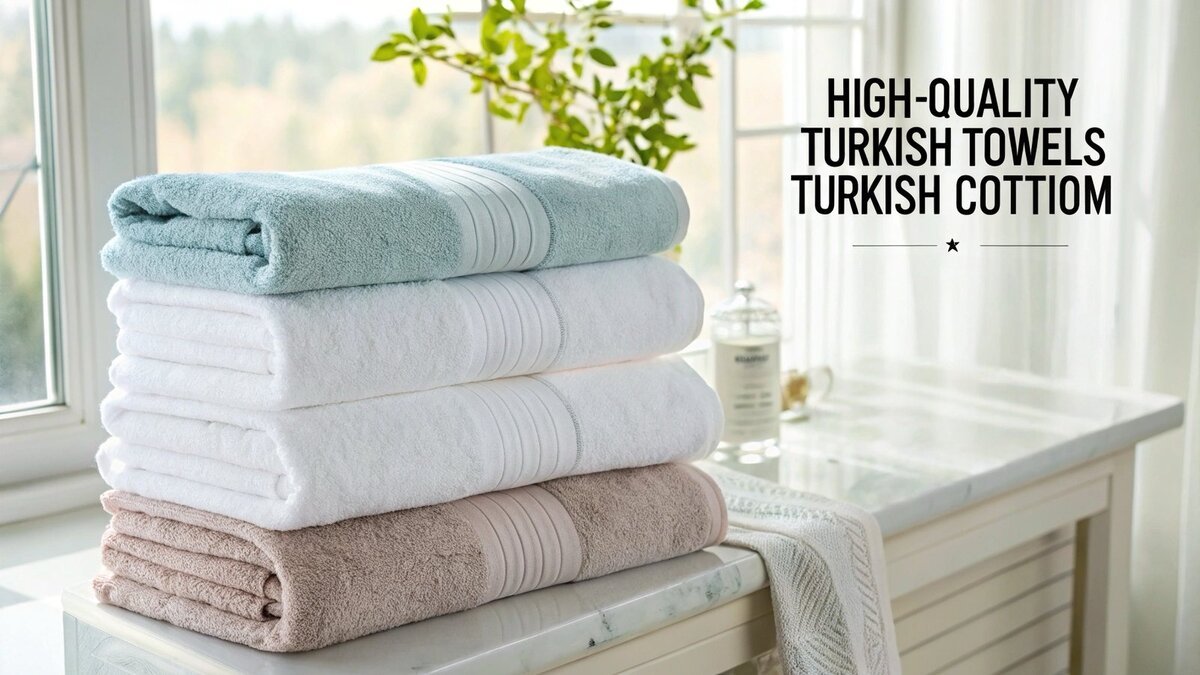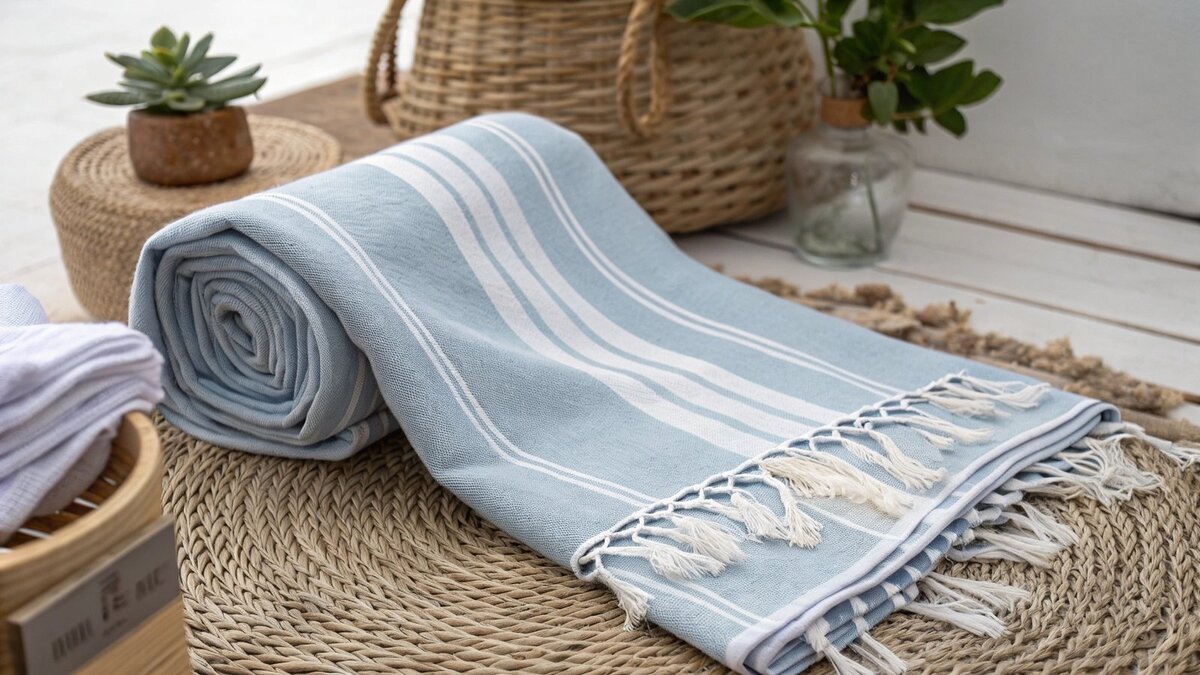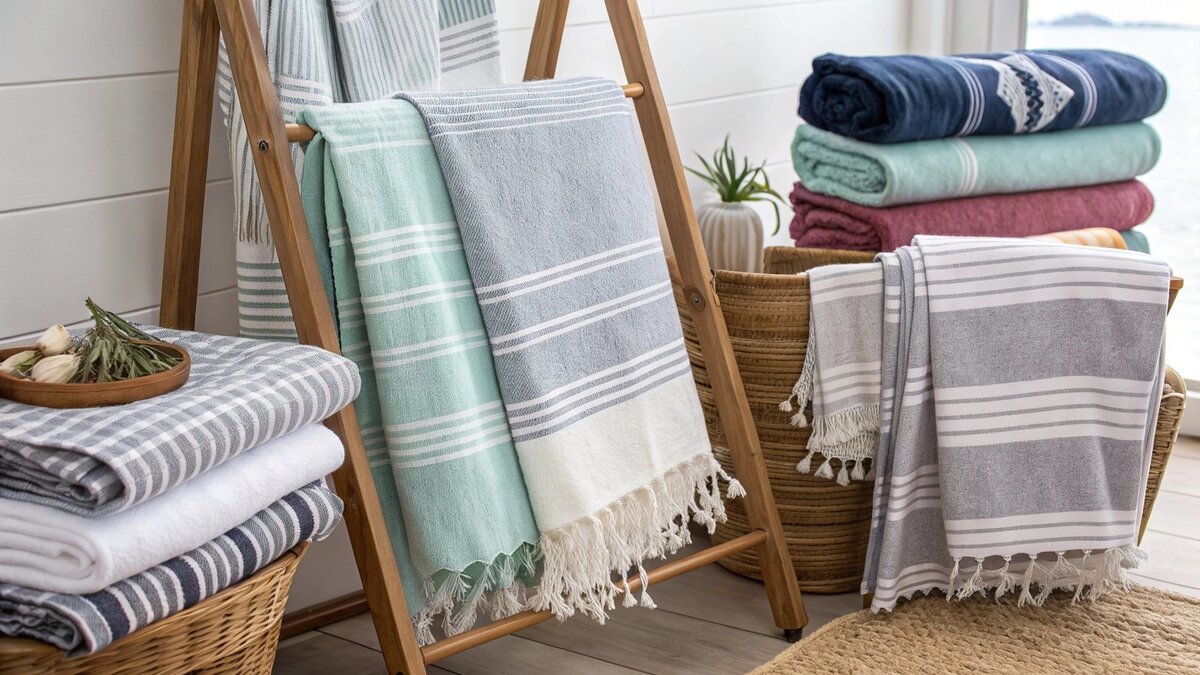Struggling to source authentic Turkish towels? Worried about quality and high MOQs? It’s a common challenge, but one you can overcome with the right knowledge.
The best way to find a top Turkish towel manufacturer is to verify their use of 100% Turkish cotton, check for certifications like OEKO-TEX, and always request samples. Look for partners who offer low MOQs, like we do at TowelTrend, to test quality without a huge investment.
This sounds simple, but finding the right partner goes deeper than a checklist. It’s about understanding the product inside and out, so you can tell the difference between a true premium towel and a clever imitation. It’s about more than just a "Made in Turkey" label. Let’s break down what makes a Turkish towel truly great and how you can spot the best manufacturers for your brand, no matter where they are located.
Who makes the best Turkish towels?
You want the best for your brand, but every supplier claims they’re number one. How do you cut through the marketing noise and find a truly reliable partner?
The best Turkish towels are made by manufacturers who specialize in long-fiber Turkish cotton and have a proven track record. They should have transparent processes, solid certifications like OEKO-TEX, and be willing to work with your brand’s specific needs, from design to delivery.
When I first started in this industry, I flew to Denizli, the heart of Turkish textile production. I learned that a great towel isn’t just about a location; it’s about expertise. While many amazing artisans are in Turkey, top-tier manufacturers worldwide, including us at TowelTrend, have mastered the techniques and sourcing to produce authentic, high-quality Turkish towels. The "best" manufacturer for you is one that combines this expertise with a business model that fits your needs. I remember working with a startup that was about to place a huge order with a Turkish factory, but the communication was slow and unclear. We stepped in, provided them with identical quality samples from our own line, and turned around their 500-piece test order in 15 days. They got the product they wanted without the risk.
Key Traits of a Top-Tier Manufacturer
A great partner makes your life easier. They provide clarity, consistency, and a path to scale your business.
| Feature | Why It Matters for Your Brand |
|---|---|
| Specialization in Turkish Cotton | They understand the unique properties of the fiber and how to weave it for maximum durability and quick-drying performance. |
| Certifications (OEKO-TEX, BSCI) | This is non-negotiable. It guarantees the product is safe from harmful chemicals and produced ethically. It protects your customers and your brand reputation. |
| Low MOQ Capability | A partner offering low MOQs (like our 100-piece starts) shows they are confident in their quality and willing to help you grow. |
| In-House Quality Control (QC) | This ensures that your 1st order and your 10th order are identical. They should keep shade records and quality reports for every batch. |
Ultimately, the best manufacturer is a partner, not just a supplier.
How can you tell a quality Turkish towel?
Is that towel you’re sourcing truly premium, or just a good-looking fake? It’s almost impossible to tell from a supplier’s photo. Let me show you what to look for.
You can tell a quality Turkish towel by three key things: the material, the weave, and its feel over time. It must be 100% Turkish cotton, have a tight and flat weave, and become noticeably softer after each wash. Anything else is a red flag.
When you’re evaluating samples, you need to be a detective. I’ve seen too many brands get burned by towels that look great on day one but fall apart after a few washes. One client came to us after their previous supplier sold them "Turkish towels" that were actually a cheap cotton-poly blend. They started shedding and pilling almost immediately, leading to customer complaints and returns. This is why we send pre-production samples and encourage every client to perform a few simple tests. It’s the only way to be certain you’re getting the real deal. A quality towel is an investment in your brand’s reputation, and it all starts with knowing what to look for.
The Three Pillars of Quality
-
Material: The 100% Turkish Cotton Rule
Genuine Turkish towels are made from cotton grown in the Aegean Region of Turkey. This cotton has extra-long fibers, which is the source of its strength and smoothness. When you see a label, it must say "100% Turkish Cotton." If it says "cotton blend" or just "cotton," be skeptical. -
Weave: Look for a Tight, Flat Weave
Unlike plush terry towels, traditional Turkish towels have a flat weave. Run your hand over it. It should feel smooth and solid. A tight weave ensures the towel is durable and absorbent, yet thin enough to dry quickly. A loose, flimsy weave is a sign of poor craftsmanship and lower-quality fiber. -
The Wash Test: Softer Over Time
This is the ultimate test. A real Turkish towel doesn’t rely on chemical softeners that wash out. Its long, natural fibers will actually bloom and get softer and more absorbent with each wash. A low-quality towel will do the opposite; it will get stiff and scratchy. Always wash your samples a few times before placing a bulk order.
Which is better Egyptian or Turkish towels?
It’s the great debate in the towel world: Egyptian versus Turkish cotton. Choosing the wrong one for your brand can lead to unhappy customers who expected something different. So, which is the right fit?
Neither is inherently "better," they’re just different. Egyptian cotton is extremely absorbent and plush, perfect for a luxurious bath. Turkish cotton is lighter, dries much faster, and is ideal for the beach, gym, or travel. The best choice depends entirely on your customer’s needs.
I once worked with a boutique hotel chain that wanted to upgrade all their towels. They initially thought they wanted Egyptian cotton everywhere because it sounded more luxurious. But we talked about the use case. For their poolside and spa, guests needed towels that would dry quickly between uses in the humid air. Turkish towels were the clear winner there. For the in-room bath experience, where plushness and absorbency were key, we went with Egyptian cotton. By understanding the specific strengths of each material, they were able to provide a better guest experience. It’s not about picking a winner; it’s about picking the right tool for the job. Your brand should do the same.
A Head-to-Head Comparison
| Feature | Egyptian Cotton Towel | Turkish Cotton Towel |
|---|---|---|
| Primary Strength | Maximum Absorbency | Quick-Drying |
| Fiber Type | Extra-long, dense fibers | Long, smooth fibers |
| Feel & Weight | Plush, thick, and heavy | Lightweight, soft, and smooth |
| Drying Time | Slow to dry; can get musty | Very fast to dry; stays fresh |
| Best Use Case | Luxury home bath, spa | Beach, gym, travel, everyday bath |
| Key Benefit | Unmatched plushness and water absorption. | Versatility, packability, and practicality. |
Think about your target customer. Are they looking for a thick, spa-like towel to wrap up in after a long bath? Go with Egyptian. Are they an active person who needs a towel for the gym, or a family that needs hardworking towels for the beach? Turkish is the better choice.
Are Turkish towels really worth it?
They often come with a premium price tag. So, are Turkish towels a smart investment for your business, or just an overhyped trend you should skip?
Absolutely. Turkish towels are worth it for their unmatched durability, versatility, and quick-drying properties. Their longevity provides better value over time, and their lightweight, stylish look appeals to modern consumers, justifying the cost for many markets.
The value of a Turkish towel isn’t just in the initial feel; it’s in its performance over its entire lifespan. I remember a DTC client who was hesitant about the cost. They were focused on a low price point. I convinced them to launch a small, 100-piece test run of our Turkish towels, marketed not just as towels but as "the ultimate travel companion." They positioned it as a beach wrap, a gym towel, and a travel blanket. It sold out in a week. The customers weren’t just buying a towel; they were buying a multi-use, durable, and stylish product. That’s the real value. They quickly realized that a higher-quality item with a better story can be far more profitable than a cheap, generic alternative.
The Real Value Proposition
-
The Durability Dividend: The long fibers of Turkish cotton mean the towels are incredibly strong. They resist pilling and shedding, lasting for years when cared for properly. A towel that lasts twice as long is effectively half the price for the end consumer, which is a powerful selling point.
-
The Versatility Advantage: This is where Turkish towels truly shine. You can market them as a bath towel, a beach towel, a sarong, a scarf, a picnic blanket, or a gym essential. This broadens your potential customer base far beyond just home goods buyers.
-
The Practicality Factor: In a world where people are busy and space is limited, practicality sells. Turkish towels are compact and lightweight, making them easy to pack and store. The quick-drying feature is a huge plus—it means less time in the dryer and less chance of mildew. It’s a functional benefit customers feel every time they use it.
Conclusion
Finding the right manufacturer means knowing what defines a quality Turkish towel and partnering with a supplier who supports your brand’s growth with flexibility, reliability, and expertise.











